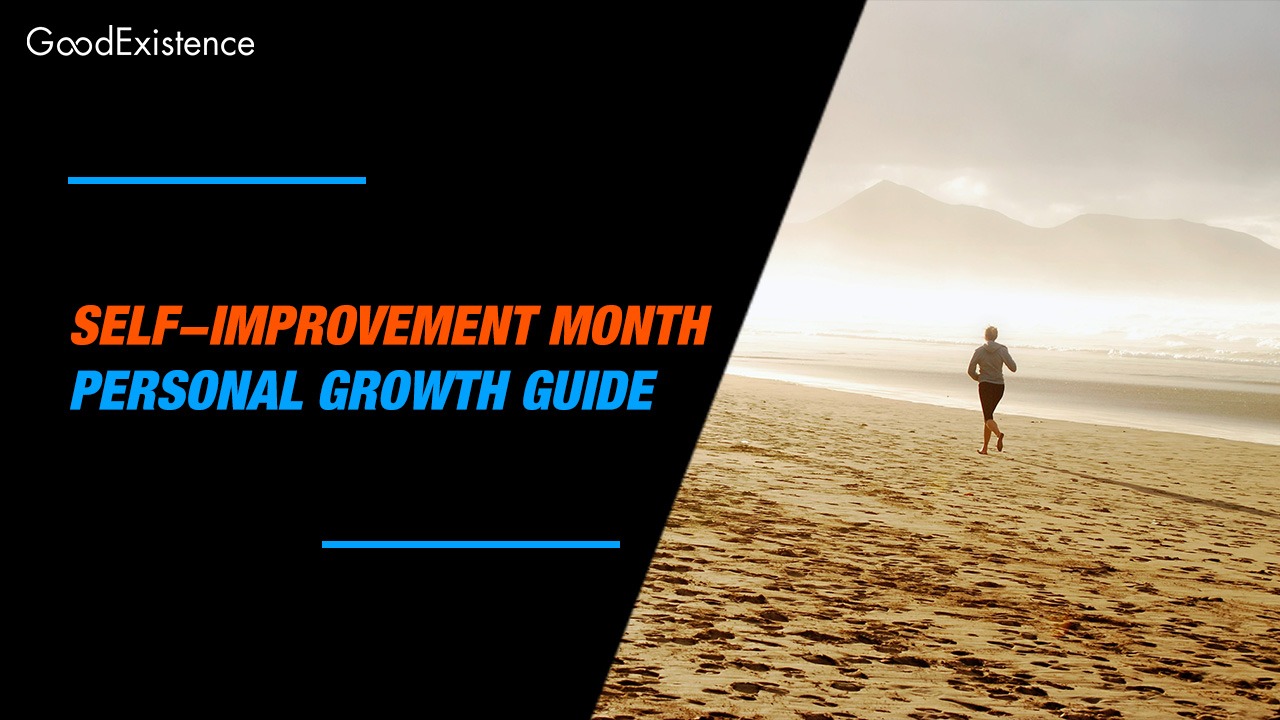
Hello, dear reader! If you’ve never heard of Self-Improvement Month, allow me to enlighten you. Held every September, this month is a golden opportunity to focus on enhancing your quality of life in various dimensions.
Whether you’re looking to lose weight, learn a new skill, or simply find peace of mind, Self-Improvement Month can act as a catalyst for change.
What is Self-Improvement Month?
Self-Improvement Month is an annual practice that takes place in September. It is dedicated to encouraging individuals to focus on their personal growth and development.
While not officially recognized by any government, it is widely celebrated by various organizations, communities, and individuals who believe in the power of self-betterment.
When is Self-Improvement Month?
Self-Improvement Month takes place in September, encouraging individuals to focus on personal growth, set new goals, and develop habits that enhance their well-being.
But why should we care about self-improvement?
The month serves as an opportunity for people to set new goals, adopt healthier habits, improve their skills, take steps to enhance their emotional well-being and live a more fulfilling life. From boosting self-confidence to improving job prospects, the benefits are endless.
Activities during this month can range from reading self-help books and taking up exercise regimes to attending personal development workshops and setting financial goals.
Overall, it aims to inspire people to take proactive steps in becoming their best selves.
History of Self-Improvement Month
The idea behind Self-Improvement Month isn’t new. Its roots can be traced back to different wellness campaigns and self-help movements that have existed for decades.
However, dedicating an entire month to the endeavor has turned it into a sort of cultural ritual that motivates people to take a good look at themselves and see where they can improve.
Just like a cherished pair of jeans that may evolve in appearance but always seems to fit just right, Self-Improvement Month has managed to adapt to contemporary needs while retaining its core essence of encouraging personal growth.
The Importance of Self-Improvement

One might question, “Why all the emphasis on self-improvement?” The reasons are manifold.
Not only does it offer immediate psychological benefits like increased happiness and reduced stress, but it also sets the stage for future success in both personal and professional endeavors.
In an increasingly competitive world, self-help acts as your secret arsenal, preparing you for challenges and enabling you to seize opportunities as they arise.
Four Pillars of Self-Improvement
Self-improvement can feel overwhelming if you don’t know where to start. It’s helpful to break it down into four main pillars: Physical Health, Emotional Well-being, Intellectual Growth, and Spiritual Enlightenment.
Think of these as the foundational walls of a house. Without any one of them, the structure isn’t as robust as it could be.
1. Physical Health

Exercise: A Must-have Routine
Did you know that exercise has benefits beyond physical fitness?
Regular exercise has been proven to improve mental health by releasing endorphins, which act as natural mood lifters.
Whether it’s weight lifting, swimming, or simply walking, exercise is a non-negotiable aspect of a well-rounded self-improvement plan.
Nutrition: Eating the Right Way
Another critical aspect of physical health is nutrition. No matter how much you exercise, if your diet consists of processed foods high in sugar and fats, you’re undermining your efforts.
Balanced meals rich in nutrients lay the foundation for a strong body and a sharp mind.
2. Emotional Well-being

Emotional Intelligence
Emotional intelligence involves understanding and managing your own emotions and being aware of others’ feelings.
This skill is crucial in maintaining healthy relationships and dealing effectively with stress and challenges.
Relationships: The Art of Balance
No man is an island, they say, and rightly so. Emotional well-being is closely tied to the quality of your relationships.
Investing time and energy in building strong, meaningful connections contributes to a happier, more fulfilled life.
3. Intellectual Growth

Learning: A Lifelong Commitment
Your education shouldn’t stop once you’ve obtained a degree. The world is ever-changing, and lifelong learning is the key to staying relevant and engaged.
Whether you decide to learn a new language, a musical instrument, or coding, continuous learning keeps your mind agile and opens up new pathways for personal and professional growth.
Creativity: Expanding Your Horizons
Creativity isn’t limited to artists or writers. It’s a skill that everyone can benefit from. Creative thinking enhances problem-solving and enriches your life by adding layers of complexity and beauty.
4. Spiritual Enlightenment

Mindfulness: The Path to Inner Peace
Mindfulness isn’t just a trendy term; it’s a practice that can significantly improve your quality of life. Through mindfulness, you become aware of your thoughts and feelings and can better manage your reactions to stress and adversity.
Religion and Prayer
Having a relationship with God is not only about religious practices or traditions. It goes beyond attending church services; it’s about nurturing a personal, intimate connection with God.
This relationship influences every aspect of life, providing guidance, purpose, and a greater understanding of both oneself and the world God created. This can be achieved through daily prayer.
Tips for Effective Self-Improvement

Goal Setting
Setting achievable goals provides a road map for your self-improvement journey. Use SMART criteria (Specific, Measurable, Achievable, Relevant, Time-based) to define what you want to accomplish.
Accountability
Having someone to hold you accountable can significantly improve your chances of success. Share your goals with someone you trust or consider using apps that track your progress.
Flexibility
Life is unpredictable, and it’s okay to adjust your goals as circumstances change. Being flexible allows you to navigate through life’s ups and downs without losing sight of your objectives.
Self-Improvement Month: Common Mistakes to Avoid
Setting Unrealistic Goals
While it’s good to aim high, setting goals that are too ambitious can set you up for failure and lead to disappointment. Make sure your goals are achievable within the timeframe you’ve set.
Neglecting Self-Care
Self-improvement isn’t about pushing yourself to the limit and ignoring your needs. Rest, relaxation, and self-care are crucial elements of any self-improvement plan.
Check out our related article: 15 Self-Care Ideas For Men.
Must-Read Books for Self-Improvement
Top 5 Picks
Books like “Atomic Habits” by James Clear and “The Power of Now” by Eckhart Tolle offer invaluable insights into the art of self-help. They serve as excellent guides to bettering your life in various ways.
Why Reading Matters
Reading is like a workout for your brain. It improves vocabulary, enhances empathy, and provides you with knowledge that can be applied in countless ways.
Apps and Tools for Self-Improvement
Recommended Apps
There are numerous apps available that cater to various aspects of self-improvement, from fitness and nutrition to mindfulness and personal finance. Here are some of the ones I have used in the past or still use now:
Benefits of Utilizing Technology for Self-Improvement
If used wisely, technology can be a powerful tool for self-improvement. Apps can provide structure, set reminders, and offer valuable information right at your fingertips.
Celebrities Who Advocate Self-Improvement
Notable Examples
From Oprah Winfrey to Elon Musk, many successful individuals attribute their achievements to a constant quest for self-improvement. These figures serve as inspiration and offer valuable lessons through their words and actions.
Their Insights
Listening to those who have walked the path of self-improvement and found success can offer a wealth of insights.
Many share their personal growth journeys through interviews, books, or social media, providing practical advice you can apply to your own life.
The Global Impact of Self-Improvement

Economic Benefits
Improved skills, better health, and increased productivity not only benefit the individual but also contribute to the overall economy. A healthier, more skilled populace is a more productive one, boosting economic output and quality of life for everyone.
Social Cohesion
Self-improvement has a ripple effect. When individuals focus on bettering themselves, it leads to more cohesive and harmonious communities. It’s the ultimate win-win scenario.
Self-Improvement Month – Final Words
So, dear friend, that wraps up this comprehensive guide to Self-Improvement Month. But remember, self-improvement is a continuous journey, not just a one-month affair.
The steps you take this month can set the tone for a lifetime of growth, happiness, and fulfillment.
Let this month be the catalyst for a new, improved you.
Self-Improvement Month – FAQ
It has various psychological and long-term benefits that contribute to a fulfilling life.
Physical Health, Emotional Well-being, Intellectual Growth, and Spiritual Enlightenment.
Goal setting, accountability, and flexibility are essential for success.
Titles like “Atomic Habits,” “The Power of Now,” and “Mindfulness in Plain English” are excellent choices.
From a Christian viewpoint, Self-Improvement could be seen as an opportunity to grow closer to God while also bettering oneself physically, emotionally, and intellectually.
The goal is not to become ‘better’ in a way that feeds ego or pride, but rather to become a more effective servant of God and others. Self-improvement from a Christian perspective emphasizes growing in virtues like kindness, patience, and humility.
Organizing group discussions, Bible studies focused on personal growth, or community service projects are great ways to involve your community or church in a collective self-improvement effort.
In Christianity, the body is often considered a ‘temple of the Holy Spirit.’ Therefore, taking steps to improve oneself can be seen as an act of worship and honoring God.
Apps like YouVersion Bible App, Abide, and iDisciple provide daily scriptures, meditations, and lessons that can contribute to your self-improvement journey with a Christian focus.





